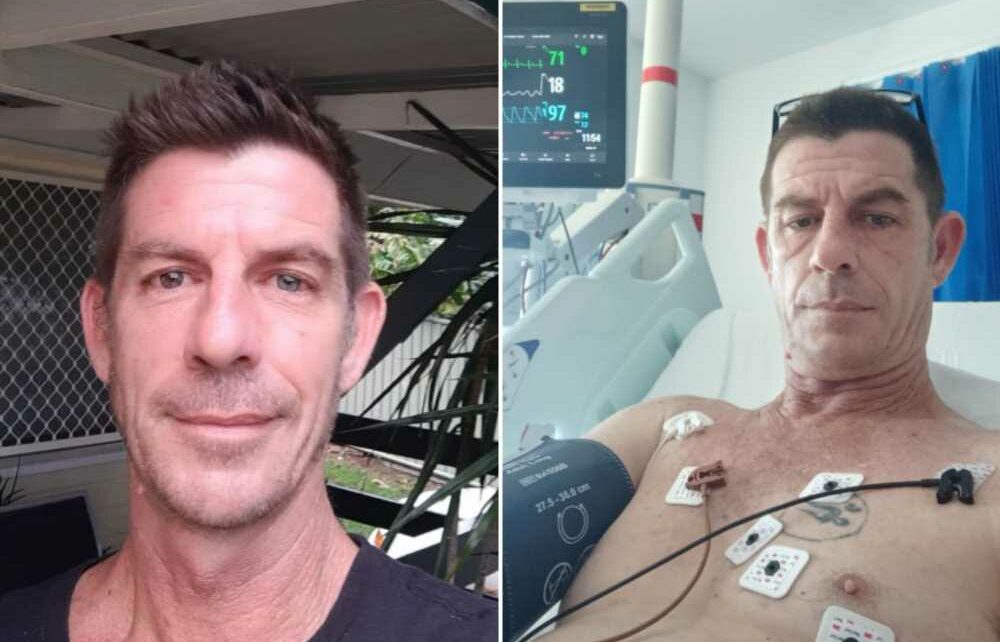PARAMEDICS thought Andy Wilson was drunk or on drugs when his vision suddenly started disappearing.
But the 53-year-old dad had in fact torn a major artery and triggered a life threatening stroke – just through his daily neck cracking habit.
Andy, an artist from Lismore, New South Wales, Australia, had suffered from a bad back since he was 12 and had been to a variety of chiropractors.
Finding that continuing treatment as an adult was too expensive, he decided to try implementing the chiropractors' methods at home.
"I've met different ones over the years and they all do this one neck adjustment. I'd relax my muscles and twist my head from side to side.
"It was an unconscious habit like cracking my knuckles, I'd do it at least once or twice a day," Andy said.
Read more on strokes
Don’t crack your neck – it could trigger a stroke, docs warn
Fit & healthy nurse suffers a stroke after chiropractor performs simple procedure
The artist twisted his neck at least twice a day for 31 years with no problems.
But his DIY neck cracking habit went horribly wrong on March 5.
Andy remembered: "I had the TV on and all of a sudden all I could hear was like digital gurgling. It was very strange.
"Then my limbs didn't feel normal, I picked up my hand and it started to wave on its own."
Most read in Health
'Healthy' girl, 13, died days after being rushed to hospital with silent killer
Taking the Pill increases risk of breast cancer by 30%, Oxford study finds
I'm an aesthetics nurse – why you shouldn't get Botox or fillers before key age
I’m sharing heartbreaking pictures of my little girl as a warning to parents
"It was painful and overwhelming, there was so much feedback from all my senses."
The artist was in his painting studio under his house, which he shares with his uncle Craig.
Andy managed to use his Google Assistant to call his uncle, who was upstairs.
He pulled himself up the stairs and tried to talk to his uncle, but started sweating profusely and had to lie down.
Andy then started throwing up and could feel pressure in his head – he lost all sense of coordination and also began losing his sight.
"Part of my left vision on both sides started to disappear.
"It was the weirdest thing. It wasn't one side, it was half of both eyes," Andy explained.
"I was extremely disoriented and nauseous. I didn't feel scared, but it was so overwhelming," he added.
When paramedics arrived, they were convinced Andy was drunk or on drugs – despite the dad not having had a drink for five years.
"They kept saying 'what have you had mate?'," Andy remembered.
Despite his uncle Craig's assurances, they dug around Andy's house for 15 minutes looking for substances.
"When I was in the ambulance and speaking to the paramedics, they were trying to tell me and Craig it was alcohol and drugs. They were quite determined," Andy said.
But once medics at the hospital noticed Andy's 'black vision', they pinpointed that he was having a stroke and things kicked into gear.
He was in intensive care for two days and in the trauma recovery ward for another two.
Andy said: "It was while I was in emergency just going into ICU and they asked if I'd had a neck injury.
"Just as they'd eliminated it being my heart or cholesterol or anything like that, I mentioned the neck adjustment, which I'd learnt to do myself.
"The stroke specialist just looked at me horrified and said 'don't ever do that'.
He explained: "The combination of the neck adjustments and my back injury caused a calcium build-up in my spine.
"This caused my right artery to sever resulting in three brain clots and a stroke to the occipital region of my brain."
What is a stroke?
A stroke is a serious life-threatening medical condition that happens when the blood supply to part of the brain is cut off.
Urgent treatment is essential – the sooner someone receives it, the less damage is likely to happen.
The signs and symptoms of a stroke vary from person to person and will depend on the part of the brain affected, as different parts of your brain control different parts of your body.
You can use the FAST method – which stands for Face, Arms, Speech, Time – to identify is someone is having a stroke:
F = Face drooping – if one side of a person's face is dropped or numb then ask them to smile, if it's uneven, you should seek medical help.
A = Arm weakness – if one arm is weak or numb then you should ask the person to raise both arms. If one arm drifts downwards, it could signify stroke
S = Speech difficulty – if a person's speech is slurred this could be a sign of a stroke
T = Time to call 999 – if a person has the signs above then you need to call 999
Other stroke symptoms include:
- sudden weakness or numbness on one side of the body
- difficulty finding words
- sudden blurred vision or loss of sight
- sudden confusion, dizziness or unsteadiness
- a sudden and severe headache
- difficulty understanding what others are saying
- difficulty swallowing
The artist praised hospital staff, saying they were 'just top notch'.
Andy was able to return home on March 9, just four days after the stroke.
He says he's now back on his feet and that the 'near-death' experience has left him feeling positive.
He added that he feels grateful for all the support, and compared it to 'being at your own funeral', seeing all the nice things people say.
"My recovery physically has been great. I've lost all my hard feelings, it's weird. I'm feeling really positive," he added.
But Andy definitely won't be attempting DIY neck adjustments again.
"The hospital outright forbade me, I can't even get a neck massage," he said.
The dad had some advice for anyone having a stroke.
"If someone's had an episode and they aren't taking it seriously, then definitely always push back. If I hadn't, then all those effects would still be with me."
An ischaemic stroke, the most common form of the condition, occurs when a blood clot prevents the flow of blood and oxygen to the brain.
This is typically caused by arteries becoming narrower over time.
A haemorrhagic stroke happens a weakened blood vessel supplying the brain bursts.
You might be more at risk of the condition if you have:
Read More on The Sun
Beauty tech shows off her fake lashes – but trolls say they belong to a dragon
Trolls hate my big lips & say I look like a duck but I love the swollen look
- high blood pressure (hypertension)
- high cholesterol
- irregular heart beats (atrial fibrillation)
- diabetes
Stroke Association estimates that about 100,000 Brits have strokes every year – and that the UK has 1.3 million stroke survivors.
Source: Read Full Article













